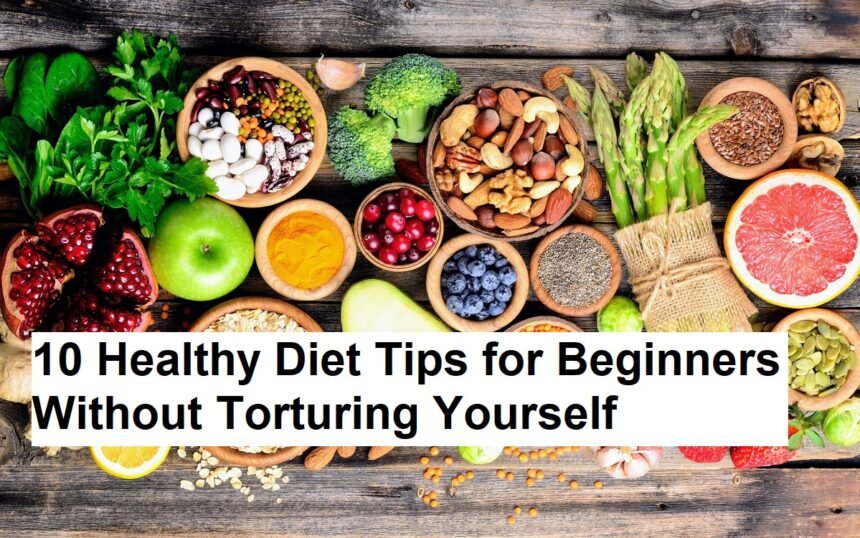Introduction
Starting a diet can feel overwhelming, especially if you think it means cutting out everything you love or living on plain salads. The truth is, eating healthy doesn’t have to feel like punishment. With the right approach, you can enjoy delicious meals, improve your energy, and lose weight the healthy way—without starving yourself or following extreme fads.
In this guide, we’ll share 10 practical healthy diet tips for beginners that focus on balance, not restriction. These are small, realistic steps you can take today to build a sustainable lifestyle.
Why a Healthy Diet Matters
Eating well is more than just a way to lose weight—it’s about supporting your overall health. A balanced diet helps:
- Maintain a healthy weight.
- Reduce the risk of chronic diseases.
- Boost energy and mood.
- Support better sleep and focus.
When you understand these benefits, it’s easier to commit to healthy habits for the long term.
1. Start Small and Be Consistent
When it comes to diet for beginners, the key is not to overhaul everything at once. Start by making one or two changes—like drinking more water or adding veggies to your lunch—and build from there.
Consistency beats perfection. Even small improvements can make a big difference over time.
2. Focus on Whole, Unprocessed Foods
One of the best healthy diet tips is to eat more whole foods. These are foods that are minimally processed and close to their natural form, such as:
- Fruits and vegetables
- Whole grains (brown rice, oats, quinoa)
- Lean proteins (chicken, fish, tofu, beans)
- Nuts and seeds
Not only are they packed with nutrients, but they also keep you full longer compared to processed snacks.
3. Build Balanced Plates
A simple way to create a healthy eating pattern is to follow the “plate method”:
- ½ plate vegetables and fruits
- ¼ plate lean protein
- ¼ plate whole grains or starchy foods
This method ensures you get the right mix of nutrients without having to count every calorie.
4. Stay Hydrated
Sometimes, what feels like hunger is actually dehydration. Drinking enough water each day supports your metabolism, digestion, and energy levels.
Aim for 6–8 glasses daily. If plain water feels boring, try adding lemon slices, cucumber, or a splash of fruit.
5. Don’t Skip Meals
Many beginners make the mistake of skipping meals to cut calories. This usually backfires, causing overeating later in the day.
Instead:
- Eat regular, balanced meals.
- Include snacks like fruit, nuts, or yogurt to avoid extreme hunger.
This approach helps maintain stable energy levels and prevents cravings.
6. Practice Portion Control
Healthy eating isn’t only about what you eat but also how much. Even healthy foods can lead to weight gain if portions are too large.
Easy Portion Control Tips:
- Use smaller plates to trick your brain into feeling satisfied.
- Fill half your plate with veggies.
- Listen to your body’s hunger cues—eat until you’re satisfied, not stuffed.
7. Limit Added Sugars and Processed Foods
Cutting out sugar completely isn’t realistic for most people, but reducing it can have huge benefits for weight and health.
Try this instead of going cold turkey:
- Swap soda for sparkling water.
- Choose dark chocolate over milk chocolate.
- Check labels for hidden sugars in sauces, cereals, and snacks.
8. Make Protein Your Friend
Protein helps you feel fuller for longer and supports muscle growth. It’s especially important if your goal is losing weight in a healthy way.
Good Protein Sources:
- Chicken, turkey, and fish
- Eggs
- Greek yogurt
- Beans, lentils, and chickpeas
- Tofu and tempeh
Include a source of protein in each meal for better balance.
9. Be Mindful, Not Restrictive
Healthy eating isn’t about strict rules—it’s about awareness and balance. If you crave pizza or ice cream, enjoy it in moderation without guilt.
Try mindful eating:
- Slow down and chew thoroughly.
- Pay attention to flavors and textures.
- Stop eating when you feel satisfied, not overly full.
This way, you can enjoy your favorite foods without derailing your progress.
10. Think Long-Term, Not Quick Fix
Crash diets or extreme restrictions may lead to fast results, but they’re not sustainable. Instead, aim for gradual changes that you can maintain.
Remember:
- Slow progress is still progress.
- A lifestyle approach is more effective than a temporary “diet.”
This mindset shift will help you lose weight in a healthy way and keep it off for good.
Common Mistakes Beginners Should Avoid
Mistake 1: Relying on Fad Diets
Trendy diets often promise quick results but can harm your health. Focus on balance, not extremes.
Mistake 2: Focusing Only on Calories
Calories matter, but nutrient quality is more important. 100 calories of chips isn’t the same as 100 calories of fruit.
Mistake 3: Expecting Immediate Results
Patience is key. Sustainable results take time, but they last longer.
Sample Beginner-Friendly Meal Plan
Here’s a quick idea for how to structure a healthy day of eating:
- Breakfast: Oatmeal topped with berries and almonds
- Snack: Apple with peanut butter
- Lunch: Grilled chicken with quinoa and roasted vegetables
- Snack: Greek yogurt with honey and chia seeds
- Dinner: Baked salmon with brown rice and steamed broccoli
Balanced, filling, and easy to prepare!
Conclusion
Eating healthy doesn’t mean starving yourself or giving up everything you love. With these beginner-friendly tips, you can build a sustainable, balanced diet that supports your energy, helps you lose weight the healthy way, and improves your overall well-being.
Remember: the goal isn’t perfection—it’s progress. Small, consistent changes add up to big results over time.
Ready to start your healthy eating journey? Pick one tip from this list and try it today—whether it’s drinking more water, building a balanced plate, or swapping soda for sparkling water.












